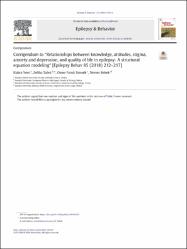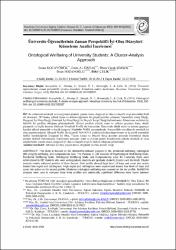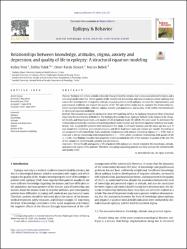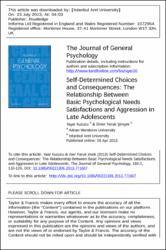Ara
Toplam kayıt 33, listelenen: 21-30
Intentional and non-intentional assessments of emotion experiences: Comparisons of old and new measures
(Taylor & Francis, 2016)
In two studies, we compared intentional and non-intentional measures of emotional well-being in terms of reliability and validity. In the first study, we expanded on the findings of ¸Sim¸sek (2011) by showing that an ...
The need for absolute truth and self-rumination as basic suppressors in the relationship between private self-consciousness and mental health
(Taylor & Francis, 2013)
Self-reflection has not so far been shown to have any specific benefits for mental health except for self-knowledge. Recent research showed that the controversy concerning the relationship between self-reflection and mental ...
Self-absorption paradox is not a paradox:Illuminating the dark side of self-consciousness
(Elsevier, 2013)
Although considered an important component of a healthy personality, self-reflection has not so far been shown to have any specific benefits for mental health. This research addresses this issue by taking into consideration ...
Relationships between knowledge, attitudes, stigma, anxiety and depression, and quality of life in epilepsy: A structural equation modeling (vol 85, pg 212, 2018)
(Elsevier Science, 2020)
Relationships between knowledge, attitudes, stigma, anxiety and depression, and quality of life in epilepsy: A structural equation modeling (vol 85, pg 212, 2018)
Ontological Wellbeing of University Students: A Cluster-Analysis Approach
(Hacettepe Univ., 2018-07)
This study is focused on the relationship between purpose in life, emotional wellbeing, ontological (life project) wellbeing, and compassionate love. The Purpose in Life subscale of Psychological Well-Being Scale, Emotional ...
Revisiting Attachment to Parents and Depression Link in Adolescence: the Importance of Language Use and Emotion Regulation
(Springer, 2019)
Although past research has provided important information about the relationship between attachment and mental health during the period of adolescence, the role of intervening variables in this association has been neglected. ...
Relationships between knowledge, attitudes, stigma, anxiety and depression, and quality of life in epilepsy: A structural equation modeling
(Elsevier Science, 2018-08)
Purpose: Epilepsy not only is a medical disorder characterized by seizures, but is also associated with stigma and a neurological disorder that affects quality of life. Insufficient knowledge and misconceptions about ...
Mediational role of rumination and reflection on irrational beliefs and distress
(Cambridge University Press, 2019)
Background: The cognitive restructuring of maladaptive beliefs within many cognitive behavioural psychotherapies typically encourages the client to undertake self-reflection. However, whilst self-consciousness can aid ...
The relationship between language use and depression: illuminating the importance of self-reflection, self-rumination, and the need for absolute truth
(Taylor & Francis, 2013)
The main aim of the present study was to provide additional knowledge about the mediatory processes through which language relates to depression. Although previous research gave clear evidence that language is closely ...
Self-determined choices and consequences: the relationship between basic psychological needs satisfactions and aggression in late adolescents
(Taylor & Francis, 2013)
This research examined the mediatory role of life purpose and career indecision in the relationship between the satisfaction of basic psychological needs and aggression. Data were collected from high school students (n = ...




















